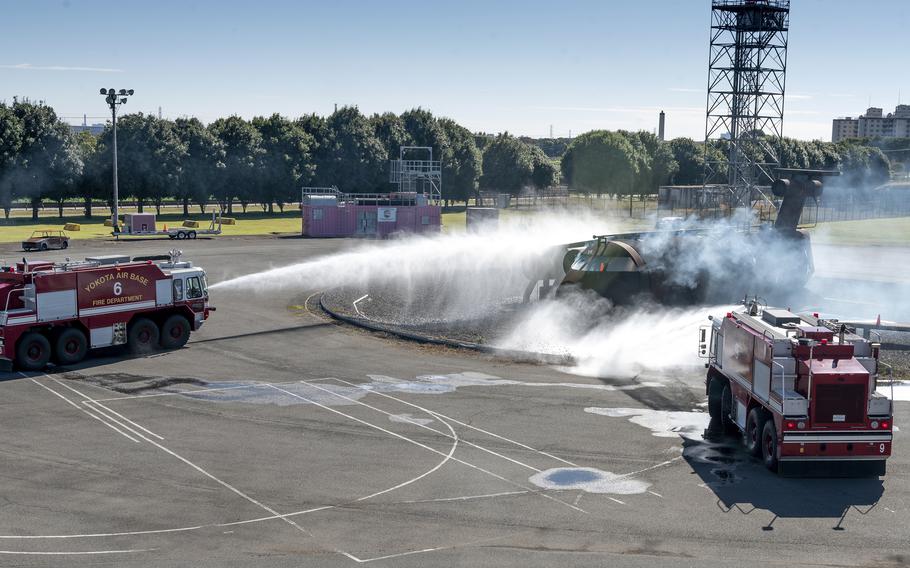
U.S. and Japanese military firefighters train together at Yokota Air Base, Japan, Oct. 26, 2022. (Machiko Arita/U.S. Air Force)
YOKOTA AIR BASE, Japan — The U.S. Air Force is storing about 400,000 gallons of contaminated water at this airlift hub in western Tokyo — significantly more than previously disclosed — and plans to treat and release it, Japan’s Ministry of Defense said Wednesday.
The water, tainted with PFOS and PFOA — toxic components found in firefighting foam — is being held in a reservoir and at a fire training facility on the base, the ministry said in a news release that summarized information provided by U.S. officials at Yokota.
The U.S. Department of Defense had previously disclosed the presence of much smaller volumes of contaminated water on the base.
In October, Capt. Emma Quirk, spokeswoman for Yokota’s 374th Airlift Wing, said a burst of heavy rain on Aug. 30 caused about 12,640 gallons of water to overflow from the fire training area onto an asphalt surface and into a stormwater drainage system.
A recent DOD Inspector General report found another 250 gallons of contaminated water had been improperly stored behind Yokota’s exchange and commissary, following a fire-suppression system malfunction in January 2023.
A July 10 report by the Tokyo Shimbun, citing unnamed sources, said 167 gallons of contaminated water spilled at the shopping center’s loading dock on Jan. 25, 2023.
On Wednesday, Japanese national and local officials visited Yokota, where they were briefed by subject matter experts, according to a same-day news release from the wing.
During the visit, U.S. officials told their Japanese counterparts that 300,000 gallons of contaminated water are stored in an on-base reservoir, and another 100,000 gallons at the firefighting training facility, according to the ministry.
The combined PFOS and PFOA concentration in the reservoir water is approximately 1,240 nanograms per liter, the U.S. officials said, according to the ministry.
PFOS and PFOA are part of a class of chemicals known as PFAS, often referred to as “forever chemicals” because of their persistence in the environment and human body, according to the U.S. Environmental Protection Agency. These compounds were once used in firefighting foam that the U.S. military has since ordered removed from its bases in Japan.
The EPA updated its health advisories in 2021 to state that no level of PFOS or PFOA in drinking water is considered safe. Lab animal studies cited by the American Cancer Society have linked exposure to increased risks of breast, liver, pancreatic and testicular tumors.
Yokota’s tainted water will be treated with granular activated carbon filters to reduce contamination levels to below 50 nanograms per liter before it is discharged into a storm drain flowing from the southwest side of the base, U.S. officials said, according to the ministry.
Japanese officials, during the base visit, collected samples of treated water for testing.
“After all water has been removed from the reservoir and fire training facility, the connections between the two areas will be disconnected and plugged and both areas will then be filled with soil to prevent accumulation of storm water,” the U.S. officials told their counterparts, according to the ministry’s release.
The 374th Airlift Wing at Yokota confirmed the water survey in its news release.
“This is a huge step in the right direction,” wing commander Col. Richard McElhaney said in the release. “We are all One Community here and our mutual trust and friendship is a top priority. I’m thrilled to take another step toward closing this chapter and making Japan a better place for all of us.”
Analysis of the water samples is expected to take two to three weeks, a Tokyo Metropolitan Government official handling U.S. military matters said by phone Thursday. Some Japanese officials customarily speak to the media on condition of anonymity.
Local authorities requested the survey after the Air Force informed them last month of its plan to release treated water.
This marks the first time Japanese officials have entered Yokota to collect water samples, the metro government official said.